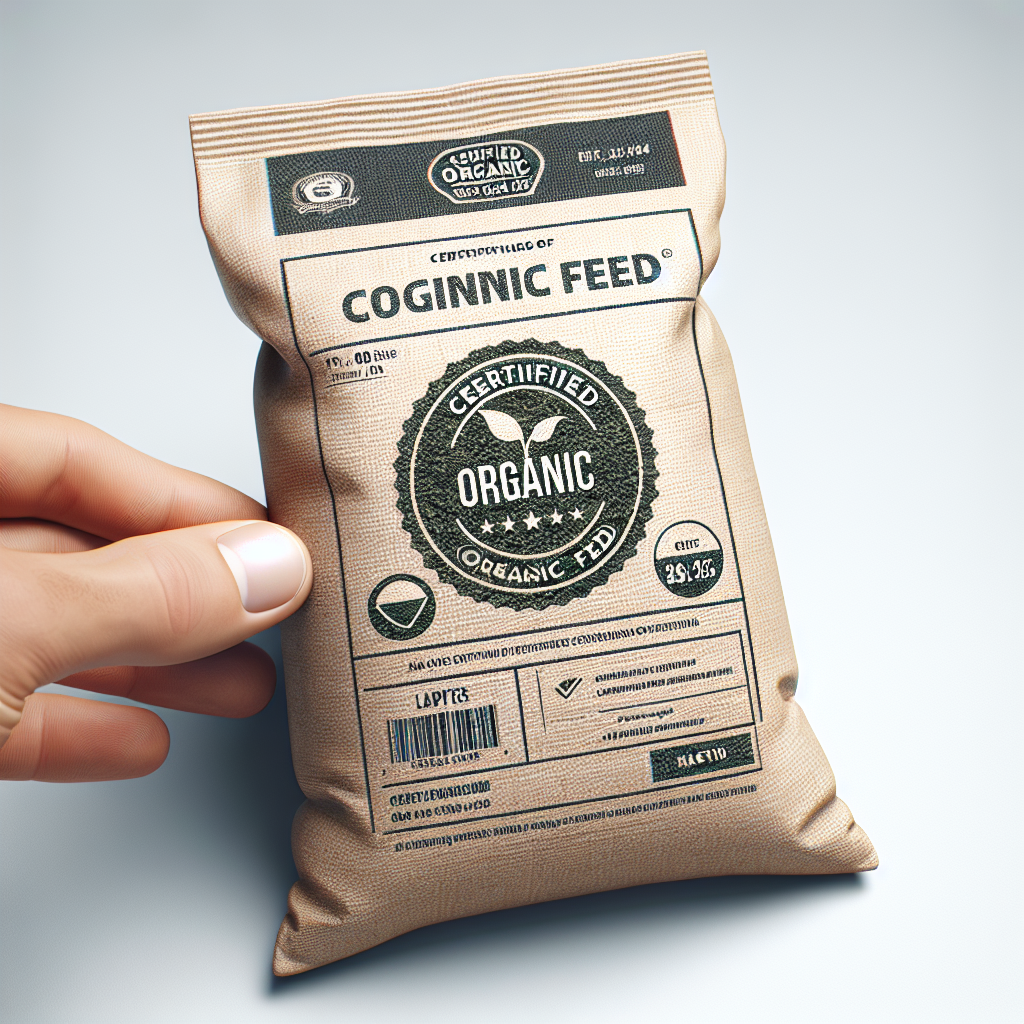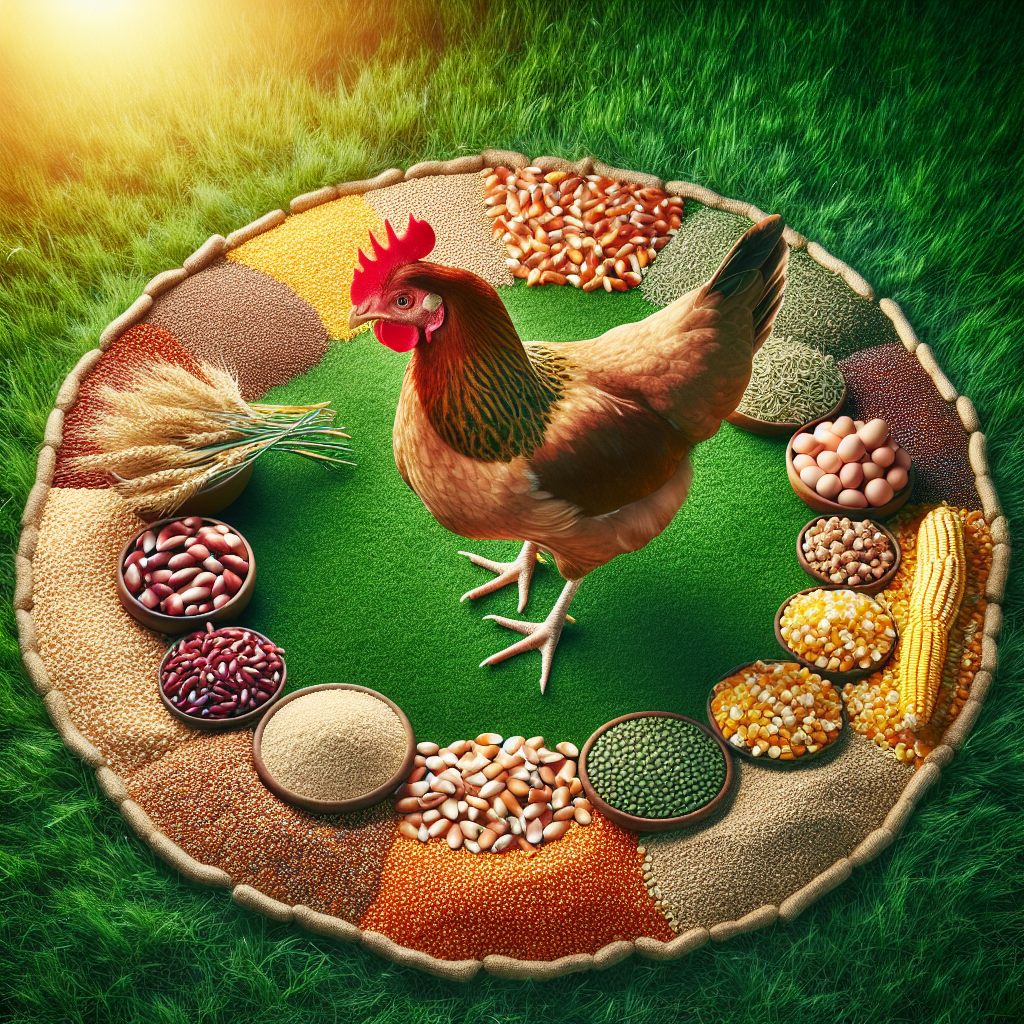Imagine a world where chickens are not only well-fed but also live longer, healthier lives. This captivating article invites you to explore the fascinating realm of organic feed and its profound impact on the overall well-being and longevity of chickens. Discover the remarkable benefits of feeding chickens organic food and how it contributes to their overall health, happiness, and longevity. Get ready to embark on a journey of understanding the power of organic feed and its transformative effects on our feathered friends.
Benefits of Organic Feed for Chickens
Nutritional Value of Organic Feed
Organic feed for chickens is composed of ingredients that are grown without the use of synthetic pesticides, herbicides, or genetically modified organisms (GMOs). This ensures that the feed is free from harmful chemicals and contains a higher percentage of essential nutrients. Organic feed is often made with high-quality, non-GMO grains and seeds, providing chickens with a balanced diet that supports their growth, development, and overall health.
Reduced Exposure to Chemicals and Toxins
One of the key advantages of organic feed is that it significantly reduces the exposure of chickens to harmful chemicals and toxins. Non-organic feed often contains residues of pesticides and other agricultural chemicals used in conventional farming practices. By feeding chickens organic feed, you are ensuring that they are not consuming these potentially harmful substances, which can have negative effects on their health and well-being.
Enhanced Immune System
Organic feed promotes the development of a stronger immune system in chickens. The absence of chemical additives and toxic substances found in conventional feed allows the chickens’ immune systems to function optimally. Chickens fed with organic feed have been shown to have a higher resistance to common poultry diseases, reducing the need for antibiotics and other medications.
Increased Egg Quality and Quantity
Chickens that are fed organic feed produce eggs that are not only healthier but also of higher quality. Organic feed provides essential nutrients that contribute to the development of strong eggshells, vibrant yolks, and better overall taste. Additionally, chickens fed organic feed often lay eggs more consistently, leading to a higher quantity of eggs produced.
Effect on Chicken Well-being
Improved Gut Health
Feeding chickens organic feed has a positive impact on their gut health. Organic feed is typically free from additives and synthetic substances that can disrupt the delicate balance of bacteria in the chickens’ digestive systems. This helps maintain a healthy gut microbiome, which is crucial for efficient digestion and nutrient absorption.
Stress Reduction
Organic feed can contribute to reducing stress levels in chickens. The absence of chemical additives and the consumption of a natural, balanced diet help regulate hormones and promote a sense of well-being in the flock. This can lead to calmer and more content chickens, which translates to better overall welfare.
Better Feather Development
Organic feed plays a significant role in improving feather quality in chickens. The nutrients present in organic feed, such as protein and essential fatty acids, promote healthy feather growth and strength. Chickens fed organic feed often exhibit vibrant, lustrous plumage, which is not only visually appealing but also indicative of their overall health.
Increased Exercise and Foraging Behavior
Organic feed encourages natural foraging behavior in chickens. The absence of added growth stimulants and chemicals in organic feed motivates chickens to search for food, stimulating physical activity and mental enrichment. This increased exercise and foraging behavior contribute to healthier, more active chickens.
Impact on Chicken Longevity
Reduced Risk of Diseases
Feeding chickens organic feed has been linked to a reduced risk of diseases. The absence of harmful chemicals and the presence of essential nutrients in organic feed help support the overall health and immune system of the chickens, making them less susceptible to illnesses. Healthy chickens are more likely to live longer, giving you the opportunity to enjoy their presence for an extended period.
Enhanced Vitality
Organic feed promotes vitality in chickens. The higher quality and nutritional value of organic feed support optimal body function, leading to increased energy levels, healthier cardiovascular systems, and improved overall well-being. Vitality is an important aspect of chicken longevity, as it helps them thrive and live a fulfilling life.
Extended Egg-Laying Period
Chickens fed organic feed have been observed to have an extended egg-laying period. The balanced nutrients and overall healthier condition of chickens consuming organic feed contribute to their ability to lay eggs for a longer duration. This extends the productive life of your chickens and ensures a consistent supply of fresh, organic eggs.
Comparison with Conventional Feed
Lower Levels of Contaminants
Organic feed contains lower levels of contaminants compared to conventional feed. Conventional feed may contain residues of pesticides, herbicides, and other chemicals used in conventional farming practices. These contaminants can accumulate in chickens’ bodies over time and may be ingested by humans when consuming poultry products. By choosing organic feed, you can minimize your exposure to these potentially harmful substances.
Fewer Antibiotics and Hormones
Organic feed does not include antibiotics or hormones, which are commonly found in conventional feed. The use of antibiotics in conventional farming can contribute to the development of antibiotic resistance in bacteria, posing a potential threat to human health. By opting for organic feed, you are reducing the intake of antibiotics and hormones in chicken products, promoting a safer food chain.
Less Environmental Impact
Conventional feed production often involves the use of synthetic fertilizers, pesticides, and other chemicals that can harm the environment. Organic feed, on the other hand, is produced using sustainable farming practices that prioritize soil health, biodiversity, and water conservation. By choosing organic feed, you are supporting environmentally-friendly farming methods and contributing to a healthier ecosystem.
Organic Certifications and Regulations
USDA Organic Certification
In the United States, the USDA Organic certification ensures that organic feed meets specific standards. This certification guarantees that the feed is produced without the use of synthetic fertilizers, pesticides, genetically modified organisms, and certain other additives. When purchasing organic feed, look for the USDA Organic seal to ensure you are feeding your chickens a high-quality, organic diet.
European Union Organic Labeling
For those in the European Union, organic feed is regulated by specific organic labeling standards. Each EU country has its own certification body responsible for ensuring that organic feed meets these standards. The EU organic labeling guarantees that the feed has been produced according to strict organic requirements, providing assurance to consumers.
Standards for Organic Poultry Feed
Organic poultry feed must adhere to certain standards to maintain organic certification. These standards typically include requirements for the sourcing of ingredients, the use of non-GMO grains, absence of synthetic additives, and compliance with organic farming practices. By understanding these standards, you can make informed decisions about the organic feed you choose for your chickens.
Challenges and Limitations
Higher Cost
One of the main challenges of feeding chickens organic feed is the higher cost compared to conventional feed. Organic feed production involves stricter regulations and higher-quality ingredients, which can result in higher prices. However, it’s important to consider the long-term benefits to the health and well-being of your chickens when evaluating the cost of organic feed.
Availability of Organic Feed
Another limitation of organic feed is its availability. Depending on your location, finding a reliable source of organic feed may require more effort compared to conventional feed. It may be necessary to plan ahead, establish relationships with organic feed suppliers, or even consider producing your own feed to ensure a consistent supply.
Addressing Nutritional Deficiencies
Though organic feed provides a well-rounded diet, it’s still important to address potential nutritional deficiencies. Consult with an avian veterinarian or poultry nutritionist to ensure that your chickens’ nutritional needs are met through a well-balanced and varied diet, possibly supplemented with vitamins or minerals. Regular monitoring and tweaking of their diet will help prevent any deficiencies over time.
Practical Tips for Organic Feeding
Selecting High-Quality Organic Feed
When choosing organic feed for your chickens, opt for high-quality options from reputable brands. Look for feed that is certified organic and meets the specific nutritional requirements of your chickens. Consider seeking recommendations from experienced poultry keepers or consulting with feed experts to ensure you are selecting the best feed for your flock.
Balancing Nutritional Requirements
It’s essential to balance the nutritional requirements of your chickens when feeding them organic feed. Consult with a poultry nutritionist or avian veterinarian to determine the appropriate ratios of protein, carbohydrates, fats, vitamins, and minerals for your specific flock. This will help ensure that your chickens receive a well-rounded diet and thrive on organic feed.
Introducing Organic Feed Gradually
When transitioning your chickens to organic feed, it’s important to do so gradually. Abrupt changes in diet can upset the delicate balance of their digestive systems and cause digestive upset. Start by mixing small amounts of organic feed with their current feed and gradually increase the proportion of organic feed over several days. This gradual transition will help minimize any digestive disturbances.
Research and Studies
Evaluating the Effects of Organic Feed on Chickens
Numerous studies have been conducted to evaluate the effects of organic feed on the health and well-being of chickens. These studies have shown that organic feed can positively influence various aspects, including egg quality, immune system function, and overall vitality. Researchers continue to explore the benefits of organic feed, further validating its role in chicken nutrition.
Comparative Analysis: Organic vs. Conventional Feed
Comparative analyses have been conducted to compare the effects of organic and conventional feed on chickens. These analyses have consistently shown that chickens fed organic feed exhibit better overall health, reduced exposure to harmful substances, and improved production and longevity compared to those fed conventional feed. The results of these studies highlight the superiority of organic feed in promoting the well-being and longevity of chickens.
Conclusion
Optimizing the well-being and longevity of chickens is crucial for poultry keepers, and organic feed plays a significant role in achieving these goals. The benefits of organic feed, such as increased nutritional value, reduced exposure to chemicals, and improved immune system function, contribute to healthier chickens. The positive impact of organic feed on gut health, stress reduction, feather development, and exercise behavior further enhances their overall well-being. Moreover, organic feed reduces the risk of diseases, enhances vitality, and extends the egg-laying period, ensuring longer and more productive lives for your flock.
When comparing organic feed with conventional feed, the lower levels of contaminants, absence of antibiotics and hormones, and reduced environmental impact make organic feed the preferable choice for environmentally-conscious poultry keepers. Recognizing the various organic certifications and regulations, such as the USDA Organic Certification and European Union Organic Labeling, helps ensure that the organic feed you choose meets the highest standards of quality and sustainability.
Despite the challenges and limitations, such as the higher cost and availability of organic feed, the long-term benefits to chicken health and the quality of their products justify the investment. By following practical tips for organic feeding, including selecting high-quality feed, balancing nutritional requirements, and introducing organic feed gradually, you can maximize the positive outcomes of organic feed.
Research and studies consistently support the positive effects of organic feed on chickens, further reinforcing its importance in poultry nutrition. Comparative analyses consistently reveal the superiority of organic feed in promoting chicken well-being, longevity, and product quality when compared to conventional feed.
In conclusion, by opting for organic feed, you are taking a proactive step in optimizing the well-being and longevity of your chickens. Organic farming practices offer numerous benefits that extend beyond the individual chickens and contribute to a more sustainable and environmentally-friendly approach to poultry production. By recognizing the importance of organic farming practices, we can collectively work towards a future where healthy, happy chickens are the norm.




